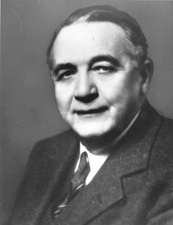John H. Overton
John Holmes Overton (born September 17, 1875 in Marksville , Louisiana , † May 14, 1948 in Bethesda , Maryland ) was an American politician ( Democratic Party ) who represented the state of Louisiana in both chambers of Congress .
Legal activity
John Overton was the youngest son of a judge. He graduated from Louisiana State University in Baton Rouge in 1895 and from Tulane University in New Orleans in 1897 , whereupon he was admitted to the Louisiana Bar in 1898 and began practicing with four partners in a joint law firm in Alexandria . He also served as the city's trial lawyer. He was also a member of the Board of Supervisors at Louisiana State University. With his wife Ada, whom he married in 1905, he had three daughters and a son.
In 1918 Overton ran for his first political mandate, but lost the Democratic Primary for the election to the US Senate against Edward James Gay . As a result, he became a supporter of Huey Long , Louisiana's leading Democratic politician at the time. Overton acted as legal advisor to Governor Long in 1929 when he was threatened with impeachment .
Congressman and Senator
After the death of MP James Benjamin Aswell on March 16, 1931, Overton won the by-election in the eighth congressional constituency of Louisiana and entered the United States House on May 12 of the same year . He left this again on March 3, 1933, after he had won the election as US Senator. He prevailed in his party's primary election against incumbent Edwin S. Broussard , who accused Overton of electoral fraud. It is true that the Senate convened a committee of inquiry; Overton was still able to take his seat on March 4, 1933. Because of the weakness of the Republicans in the southern states at the time, he won the actual election without a candidate.
He was re-elected in 1938 and 1944, with only another candidate running in 1938, the independent Maurice Clark, who did not get more than 0.17 percent of the vote. Prior to the 1944 election, Overton considered resigning, but was urged to run again in a letter from his co-Senator Allen J. Ellender . This letter had been signed by the entire Senate Democratic faction. Overton's political interests in the Senate were predominantly issues of flood control and the development of rivers and ports. He was also an advocate of racial segregation . In 1940, for example, he opposed an amendment to the Selective Service Act , which would have allowed members of minorities to join the military voluntarily; he wanted to prevent multiracial units.
John Overton was unable to complete his fourth term in the Senate. He died on May 14, 1948 at Bethesda Naval Hospital and was buried in Pineville . In 1998 he was posthumously inducted into the Louisiana Political Museum and Hall of Fame in Winnfield . His Alexandria home has been on the National Register of Historic Places since 1985 .
Web links
- John H. Overton in the Biographical Directory of the United States Congress (English)
- John H. Overton in the database of Find a Grave (English)
| personal data | |
|---|---|
| SURNAME | Overton, John H. |
| ALTERNATIVE NAMES | Overton, John Holmes (full name) |
| BRIEF DESCRIPTION | American politician (Democratic Party) |
| DATE OF BIRTH | September 17, 1875 |
| PLACE OF BIRTH | Marksville , Louisiana |
| DATE OF DEATH | May 14, 1948 |
| Place of death | Bethesda , Maryland |


